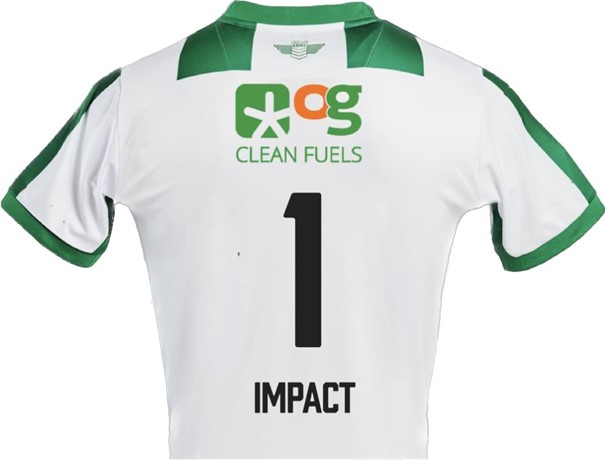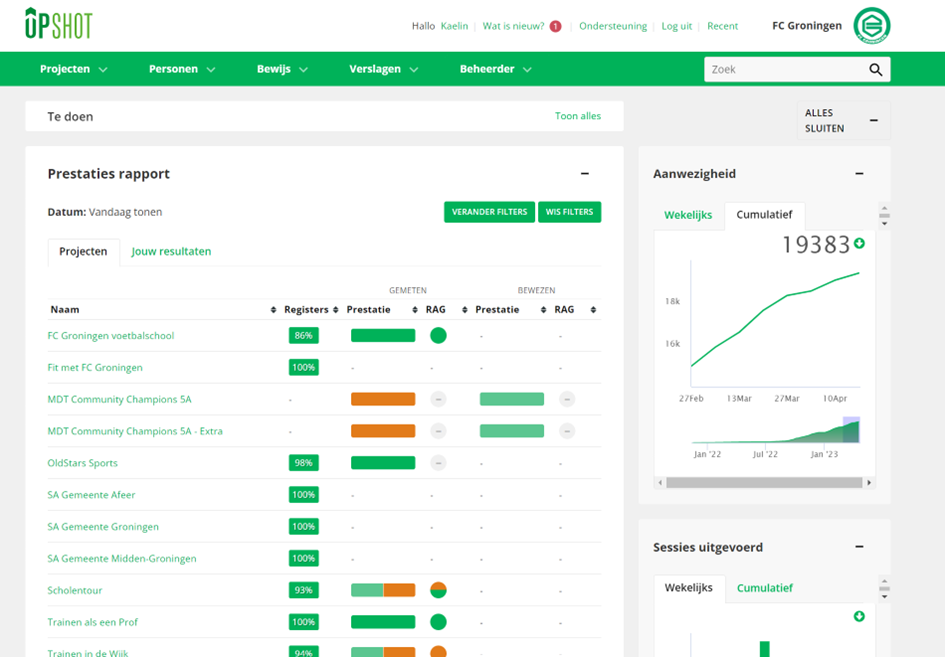1. Impact Monitoring

Situation
During the first meeting the student had with the manager of the Foundation about the internship assignment and the challenge she could take on, impact monitoring was also discussed.
The manager's wish was for the student to delve into monitoring the impact of the Foundation through a monitoring system recommended by the Eredivisie called Upshot. At the start of the internship, there was no one within the Foundation responsible for monitoring the impact and keeping track of the data. This meant that at the end of the season, data from the previous season often had to be retrieved, and as a result, valuable data may have already been lost. In consultation with the manager during the meeting, it was decided that this would be a valuable addition to the challenge the student was taking on, meaning that the student would delve into monitoring the impact of the FC Groningen Foundation from the start of the internship.
Tasks
|
Tasks |
|
Execution Phase |
|
· Responsible for the data collection · Preparing the system for every program · Development · Bi-weekly meetings with Jeroen de Jong · Creation of surveys · Input Impact Rapport Eredivisie ’22-‘23 |
|
Research and development Phase |
|
· Collaboration with the Eredivisie CV · Creation of a guide for Upshot · Following workshops about impact monitoring o Workshop Eredivisie o Workshop IT4Kids |
Action
During the internship, the student was responsible for monitoring data through Upshot, which involved keeping track of whether all data was entered correctly and ensuring that it was properly processed in the system. The first few weeks were spent on learning the program and becoming familiar with the tasks involved. Initially, it was challenging for the student to understand her responsibilities and to communicate with program leaders since they were not yet familiar with the system's technical details.
During the first period, the student struggled to locate certain data that was not entered correctly by program leaders or not entered at all. This was sometimes frustrating, but the student eventually became more comfortable with the process and was able to develop her skills in this area. The student also discovered that the entire system needed to be properly configured, which required retrieving data and spending a significant amount of time processing it. This caused the student to question the value of her work, but she discussed these concerns with their manager, who was pleased with the progress made.
The student had weekly meetings with Jeroen de Jong, a policy officer at FC Groningen, to discuss progress, identify valuable data to add to the system, and address areas that needed improvement. The data was valuable to the club's stakeholders, and the club itself placed a significant emphasis on society, which was one of the five pillars of their policy plan.
The student also had numerous meetings with program leaders to improve the system's configuration. Several programs wanted to begin with using questionnaires via the system, and the student worked with the program leaders to create and distribute these questionnaires. Although it initially required a lot of effort, the process became smoother as the student became more comfortable with the program.
Throughout the internship, the use of Upshot continued to evolve, and the student and the manager identified areas where the system needed improvement and where certain programs lacked sufficient data. They discussed these issues, and the student used them to identify development points for certain programs. The student also recognized that it was challenging to ensure that everyone used the system in the same way and that managing this process took a lot of time. As a result, the student decided to create an FC Groningen manual for Upshot, which would be part of her Honours project. This idea emerged after a conversation the student had with Aukje Geubbels of Eredivisie CV about impact monitoring, the developments and Upshot's future.
The student also attended an IT4 Kids workshop on impact monitoring. Since the student had the most knowledge of impact monitoring within the organization, she was sent to Utrecht to discuss the organization's development points, present the current impact monitoring situation to other foundations involved with IT4Kids, and learn more about the subject from the workshop host.
Result
Throughout the year, the student has managed to get almost all data from the 2022-2023 season into Upshot through a lot of dedication and working hours. This is a huge step forward for the organisation, considering the state of the system at the beginning of the year. In addition, everyone within the organisation now has an idea of impact monitoring and has realized that it is an important part of corporate social responsibility. This has created a working atmosphere in which the student no longer has to chase after the data alone, but program leaders and other staff members also think about the process of impact monitoring. The fact that almost all data from the 2022-2023 season is in Upshot has resulted in the Eredivisie's impact report questionnaire being easily filled out and based on facts. In addition, the data helps in the accountability towards partners and stakeholders, and strengthens our story towards the outside world. As a result, the student has ensured that impact monitoring has also become part of the foundation's policy plan.

Reflection
Looking back on the experience of impact monitoring over the past year, there are a number of points that have helped the student grow in confidence. The student is very happy with the opportunity and especially the trust that was given to the student to take on impact monitoring. In the first period, the student mainly struggled with taking responsibility to obtain missing data, as she felt she had to chase employees and may have been perceived as annoying by colleagues, and because it was new to their job responsibilities. The student also discussed this with the manager, but the longer the student worked within the organisation, the more natural the process became. This is, of course, because the student was new at the beginning and had to get to know the work situation and employees. In hindsight, this could have been prevented by explaining to everyone at the beginning of the year what the purpose of Upshot was and what tasks of the student were. This was not something that the student could have done herself, but rather something that could have been done by the organisation. However, the responsibility for impact monitoring provided the opportunity to get to know every employee well and challenged the student to be able to work with everyone. Looking back on the process, the student sees that a lot has been achieved in a year and is reasonably proud of the result of what is now in place.
